Brexit vs Bremain: It’s decision time
The Leave campaign promises a return to the glorious past, while Remain conjures visions of a dystopian future. Why are so few people talking about the present?
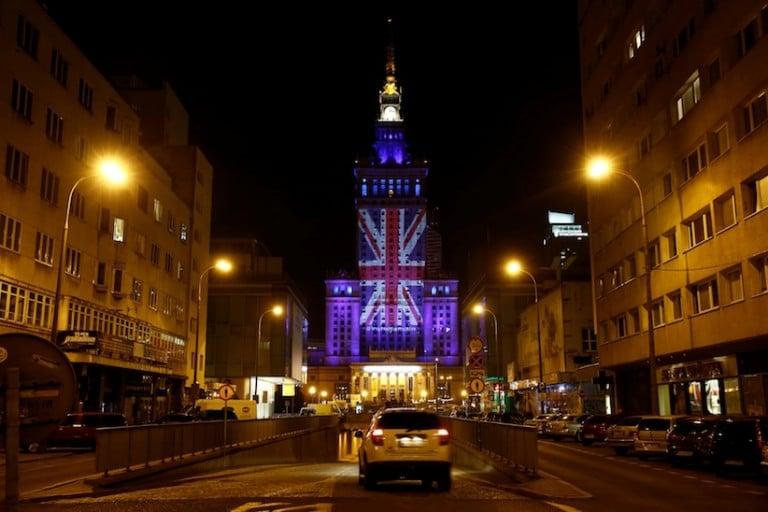
The Palace of Culture and Science is illuminated in Union Jack colours by Warsaw’s capital authorities in support of Britain staying in the EU, in Warsaw, Poland June 22, 2016. REUTERS/Kacper Pempel – RTX2HHM0
Share
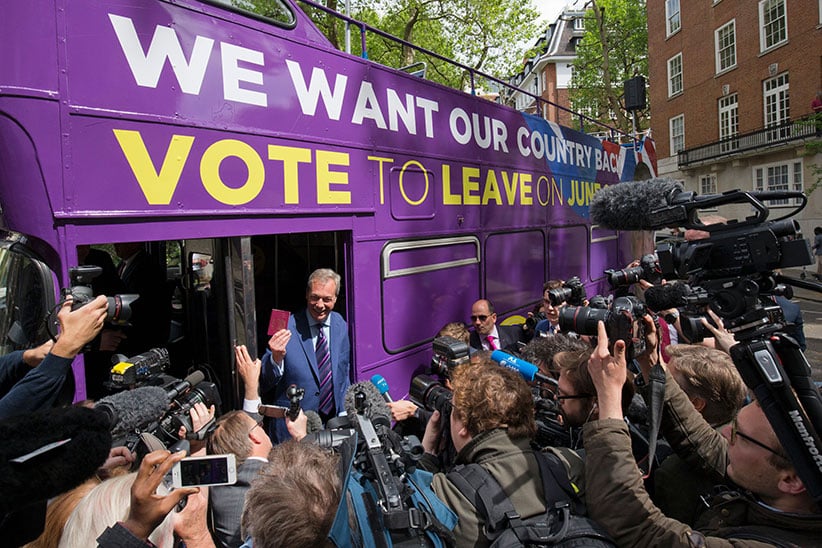
Herbie Crossman slips a set of shackles and chains onto his wrists, picks up a heavy, yellow bolt cutter and strikes a heroic pose. “Cut me free on the 23rd of June!” he shouts. “That’s all I ask.” A mass voice rendition of Elgar’s Land of Hope and Glory, recorded at the BBC’s Last Night of the Proms, is blasting out of a small speaker at his side. The souvenir table he’s manning at the back of the Leeds banquet hall offers an assortment of Union Jacks (£1), and a deck of cards featuring all the unelected commissioners of the European Union, modelled after the ones U.S. soldiers used while hunting Saddam Hussein loyalists in Iraq (£2). And for the particularly fervent, there’s an assortment of two-metre-high display posters (£40, or $74, including stand). One’s a rather wordy eviction notice, with print shrinking like an eye exam chart. Another features a map of the U.K. with the north of the country encircled in a noose, labelled with the Scottish National Party’s logo, and its south fastened to a ball and chain, emblazoned with the EU’s circle of stars flag. Subtlety is not really what this crowd is looking for.
The pro-Brexit event is technically all-party, but few, if any, in attendance have come to see Brendan Chilton, the general secretary of Labour Leave, or Peter Lundgren, a skeptical Swedish member of the European Parliament. Nigel Farage’s “battle bus,” an open-top double-decker, painted bright purple and yellow—the garish palate of his UK Independence Party—is parked right outside the doors. The night begins with his chosen campaign song, the theme from The Great Escape, the 1963 Hollywood classic about Commonwealth prisoners of war tunnelling out of a German Stalag. (The sons of its late composer, Elmer Bernstein, have publicly demanded that UKIP stop using the tune, to little evident effect.) Security is conspicuous—more than a dozen shaven-headed men in suits with radio earpieces—but there are no protesters, just fellow travellers. Earlier in the day, Farage visited the city’s historic Kirkgate Market, the birthplace of Marks & Spencer, the quintessential British department store, founded in 1894 by a Polish Jew named Michael Marks, to talk about the need to curb immigration. The evening venue, part of the Leeds United FC grounds on Elland Road, is a better match for his message. Once a powerhouse of English football, the club now languishes in the middle of the second-division table, a plaything for a meddling Italian billionaire who has fired his sixth manager in two years this very June day.
The 52-year-old UKIP leader takes the stage to a standing ovation and the cheeky strains of The Final Countdown, the lone hit by an ’80s band called Europe. Farage is buoyant. Tory cabinet ministers Boris Johnson and Michael Gove, the leaders of the official Brexit campaign, VoteLeave, won’t let him ride on their bus, but they have just endorsed something he has been demanding for years, a much stricter, points-based immigration system, like Australia and Canada’s. “There is no way in the future that they can call me or my party extremist or bigoted,” he declares to wild applause from the 400 or so in attendance. “We are in the mainstream of British politics. We are driving British politics.”
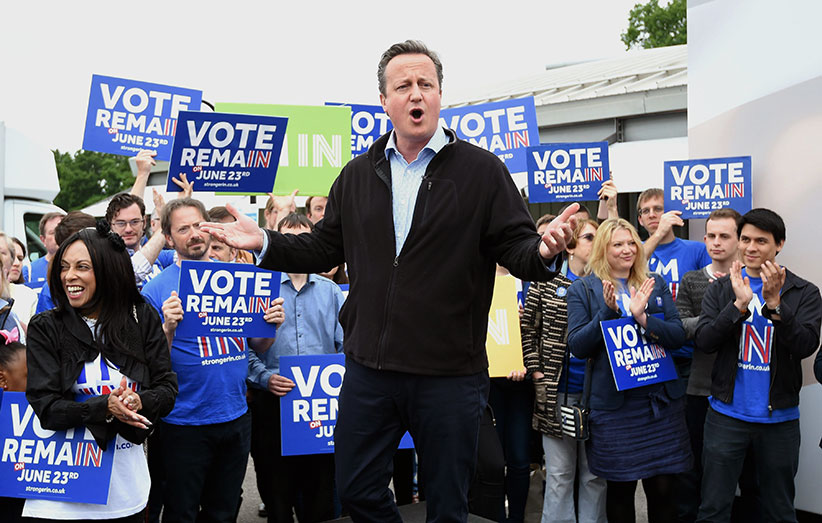
With the referendum on the U.K.’s future in the European Union just two weeks away, opinion polls have suddenly tilted toward a departure. The BBC’s poll tracker, which crunches all the numbers, now has Leave out front by five points, 48 to 43, and the undecided vote down to just nine per cent. It’s an indication that all those dire warnings from David Cameron’s Remain side about the economic consequences of withdrawal—mass job losses, a “homegrown” recession, and decades of trade turmoil—seem to be turning voters off, rather than scaring them. The campaign’s dominant issue has instead become immigration, fed by mounting public worries about the three million-and-counting EU citizens who have taken up U.K. residence since 2004, putting pressure on housing, the health system and other public services.
The temptation to indulge in the country’s last socially acceptable prejudice—a withering disdain for European bureaucracy that crosses all party lines—grows stronger by the day.
“This is our chance to get back at a political class who has given away everything we ever had, everything we ever fought for, everything we want to hand over to our grandchildren,” Farage thunders. “This is the vote when we can get back everything.”
The speech ends with the UKIP head leading the crowd in a rousing chant: “We want our country back.” David Kirby and his wife, Alison, stand near the queue of people waiting for a photo with Farage, clutching a Vote Leave banner. Neither are UKIP members, or even consider themselves political, but the message resonates. “I’m not racist, I’m patriotic,” says David, a 50-year-old textile worker. “It’s depressing, the country is unrecognizable now. I feel like a stranger.”
Related: What would it cost to leave EU? UK slaps a price tag on it
Farage ducks out the back door for a smoke before the drive back to London—not in his purple bus, but rather a chauffeured Land Rover Discovery. He says he knows why Leave is on the rise; because other politicians have finally stopped pussyfooting around the subject that most concerns the voters. “This is the issue, believe you me. Consistently, in opinion polls, for anyone who cares to look, immigration and its impacts have been the issue in British politics for many years,” he says. The UKIP leader has run for a seat in parliament seven times, failing at each turn, but he has never been more influential. (The party has a lone MP, Douglas Carswell, a turncoat Tory, but boasts 24 members of European Parliament, including Farage—the most of any British party.) Farage is now so confident of victory that he jokes about going to Ladbrokes, a betting shop, and wagering £1,000 on the outcome.
Each day seems to bring new fodder for the Brexit side. The Greek financial crisis again threatens the eurozone. A boatload of Albanian migrants had to be rescued off the Kentish coast last week, and camps have been springing up on the other side of the Channel as others prepare to try to enter the country illegally. “There are events that none of us can foresee over the next two weeks that can shift this,” Farage says. “And it is more likely that they will be in our favour than in theirs.”
On the hustings, Farage loves to talk about the cap-in-hand indignities that come with being a partner in the 28-member European Union. Lately, his example of choice has been David Cameron’s March effort to convince fellow leaders to do away with a five per cent sales tax on feminine hygiene products. The Prime Minister says he won the fight, but the deal still needs to be ratified in Brussels. In the car park, Farage is agog over the process. “I talk about the humiliation of a British Prime Minister going to beg for a tax on tampons to be reduced . . . with heads of state!” he says, skywriting with his Pall Mall. “What must they think of us? It’s unbelievable!”
David Cameron has a way of carrying himself on those rare occasions when he has to interact with members of the general public. The British press call it his “stuntman pose,” but it’s really more of boxer’s crouch: legs set wide, weight back on the balls of his feet, arms out in front as if to ward off the blows. Cameron needed all the protection he could get during the campaign’s first town-hall-style television special last week. It was a debate in name only—the Prime Minister has refused to appear with pro-Brexit rivals, either from within his own party or UKIP, saying his wants to minimize “blue on blue” clashes. So what Sky News viewers got instead was a hybrid interview show, followed by a live Q&A. Michael Gove, his secretary of state for justice, did the same for Leave the next night.
Cameron struggled to make the case for staying in the EU. “It’s 500 million people. It’s the biggest market in the world. It’s something Britain worked very hard to create,” he told the studio guests, and a select audience at home who chose politics over England v. Portugal, the national side’s last tune-up match before Euro 2016. “If you don’t have a strong economy, you can’t have the health system you want, or the schools you want . . . to leave would be an act of self-harm.”
The sales job fell flat, however, and the evening turned into a pile-on for Cameron and the relentlessly negative campaign he’s been overseeing. “Project Fear,” as it has been popularly dubbed, with its endless procession of gloomy experts, finger-wagging bank bosses and concerned Continental pols has evidently gotten up people’s noses. The Prime Minister was on the defensive from the one-hour show’s outset, called to account for his inability to come anywhere near a promise to cap net migration at 100,000 EU arrivals a year, and openly mocked for Remain’s apocalyptic rhetoric. “So what comes first? World War Three, or a global Brexit recession?” asked Sky anchor Faisal Islam, eliciting hoots and applause.
When it was their turn, the invited public were even more savage, accusing the PM of “scare-mongering,” and “hypocrisy,” then interrupting and shouting him down from their seats when he tried to respond. It was all a reminder that Cameron won a slim majority in last year’s general election not because he was the U.K.’s best-loved leader, but rather its least-loathed.
Afterwards, in the spin room next door, there was the extraordinary spectacle of a half-dozen members of Cameron’s own cabinet fanning out to either try and sing his praises, or pull out a spade to bury him. “It was a 10 out of 10 for the Prime Minister. He made it very human, he talked about jobs and the trading block and why it matters,” Nicky Morgan, the secretary of state for education, proclaimed to one scrum. “It shows how weak the arguments are for Remain,” said Andrea Leadsom, the minister of state for energy, standing only a metre away. “I think it was very difficult for him to make any inroads on immigration. Quite clearly, it’s just impossible for him to control immigration from the EU whilst we remain in it.”
There has long been a deep rift within the Conservative Party over the U.K.’s membership in EU. But Cameron’s attempt to quiet the Euroskeptics once and for all—he promised this referendum in 2013, specifically to blunt the threat of UKIP and keep his own Euroskeptic members from bolting—now looks like a very risky gamble. The BBC’s latest count has 164 members of his caucus backing Remain and 131 for Leave, with 35 as yet publicly uncommitted—a significant split for a party that enjoys just a 17-seat majority. During last spring’s election, Cameron promised voters that he wouldn’t stick around to fight the next one in 2020. And it is widely assumed that Boris Johnson’s primary motivation for taking a leading role with the Leave campaign is to further his own prime ministerial ambitions, PDQ.
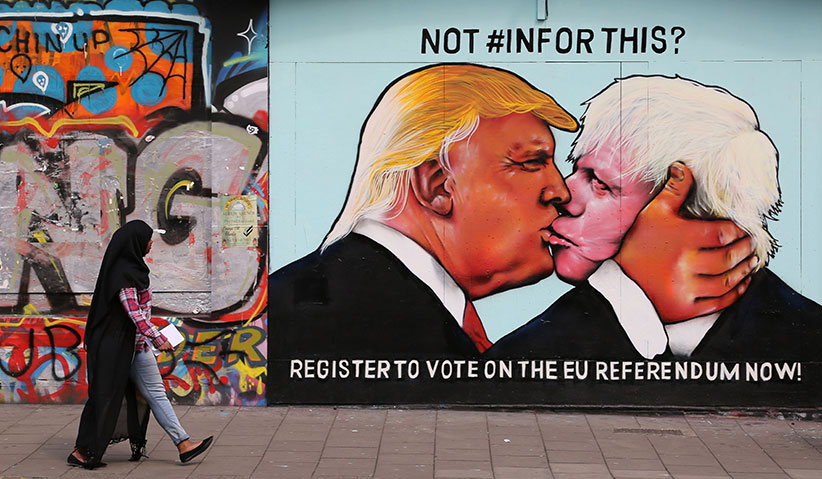
That may not be working out quite as planned either. The former mayor of London has always been known as a loose cannon, but in recent weeks he’s been plumbing Donald Trump-type depths. He’s accused global leaders backing Remain of appearing in “hostage videos” for Downing Street, and compared the EU to a “badly designed” pair of underwear. Then there was the interview with the Daily Telegraph where he played the Nazi card, warning that attempts to unify Europe inevitably turn into power grabs. “Napoleon, Hitler, various people tried this out and it ends tragically,” he said. “The EU is an attempt to do this by different methods.” “BoJo” and Leave haven’t been shy about resorting to their own scary rhetoric, pressing a widely discredited claim that the EU “costs” British taxpayers $648 million a week, or $33 billion a year. (The country’s true net budget contribution, after rebates, is $13.5 billion per year, about 0.4 per cent of GDP.) They’ve also made more than $204 billion in new spending promises from the “savings” post-withdrawal, which doesn’t add up at all.
Related: That Brexit graffiti: One picture, nearly 1,000 words
Perhaps most damagingly, Johnson has been busy stoking fears about EU expansion into—and an influx of migrants from—countries like Albania, Serbia and Turkey. It has not only made him look slightly racist, but hypocritical too, given that his own great-grandfather, Ali Kemal, was a Turkish government minister. Or maybe he’ll simply come to regret offending foreign leaders for a cheap laugh. In May, The Spectator, a magazine that Johnson used to edit, announced he had won their contest soliciting rude limericks about Turkish President Recep Tayyip Erdogan. The entry involved a goat, and dubiously rhymed Ankara with “wankerer.”
Divisions over the EU are hardly limited to Britain’s right, however. Labour’s new leader, Jeremy Corbyn, is himself a reformed Euroskeptic, and while he officially endorses Remain, he is proving a reluctant campaigner. In his first real referendum speech, last week in London, it was often difficult to ascertain just what Corbyn was promoting. “None of us are satisfied with the EU as it is,” he declared, then went on to complain at length about a proposed free trade deal between the EU and the United States. He expressed full-blown contempt for Remain’s “myth-making and prophecies of doom,” as well as the Conservative chancellor and his management of the country’s finances.“Just over a week ago, George Osborne claimed that the British economy would enter a year-long recession if we voted to leave. This is the same George Osborne who predicted his austerity policies would close the deficit by 2015. That’s now scheduled for 2021.”
It was a Conservative prime minister, Ted Heath, who brought the U.K. into the EU—then known as the European Economic Community—in 1973. The original Euroskeptics were mostly from Labour. When the party won the 1974 election, Harold Wilson, the new PM, promised to put the deal to a referendum— the British public voted 67 per cent in favour of closer ties with the Continent.
But there has always remained a strong undercurrent of suspicion about the project, and fears that the U.K.’s culture and sovereignty were somehow being eroded. Relatively few Britons identify themselves as “European”—just 16 per cent according to the latest British Social Attitudes study, a figure that has hardly budged over the survey’s 30-year history. “It’s the biggest failure,” says John Curtice, a professor of politics at Strathclyde University who oversees a project called “The UK in a Changing Europe.” “Brussels is not part of us, it’s the other.”
It’s not that the country hasn’t evolved—in fact, British identity is now deeply tied to multiculturalism. (Those who resist such changes tend to still call themselves “English.”) It’s just that the difficulties associated with EU membership seem to capture the public imagination more readily than the benefits. “Support is transactional,” says Curtice. “One section of British society has done well within the EU and another has suffered consequences. And that argument isn’t going away anytime soon.”
A group of Leave campaigners stand outside the Oakleigh Park train station in Barnet, the far northern edge of London, on a Friday evening. Every 15 minutes, a crush of commuters from the city disembark and stream out the exits. Some take the proffered flyers, other refuse politely. Only one young man is openly hostile. “Vote Leave? No chance, mate,” he says to one of the older canvassers. “It’s my future you’re ruining, not yours.”
The half-dozen Brexiteers—among them a retired ambulance driver, a business owner, a stay-at-home mom, and a woman married to a Kenyan immigrant who has brought along a Rhodesian Ridgeback named Kito, Swahili for “precious one”—all say they have nothing against Europe. Many speak of pleasant holidays in France, Spain or Greece. But there is a shared belief that the EU is out of control. “It’s the bonkers legislation that is coming out of Europe and all the rights they’re giving to criminals,” says Nick Michaelson, the owner of a label company. And there is a real fear that the Continent’s migrant crisis will soon spread across the Channel. “Did you see that they have someone in Calais teaching the children English now?” asks Barry Newman, the retired ambulance driver. “I can’t park on a single yellow line without being thrown in jail. And they can break all the international laws and we’ll give them houses,” says Mary Malde, the dog owner.
Jennifer Grocock, the mother who organized the canvas, has been a Conservative since becoming a fan of Margaret Thatcher during her high school years. “The EU is complete nonsense. There’s no accountability, no one knows who’s running it,” she says. “Personally, I think Ted Heath should be raised from the grave and slaughtered again.”
Eddie Izzard, one of Britain’s most popular comedians, is struggling to express just why the EU matters. “From Alexander the Great until World War II, for 2,500 years, we did all the killing we could. Then we finally decided to work together,” he tells the crowd. “And now, a transvestite guy tours in France.”
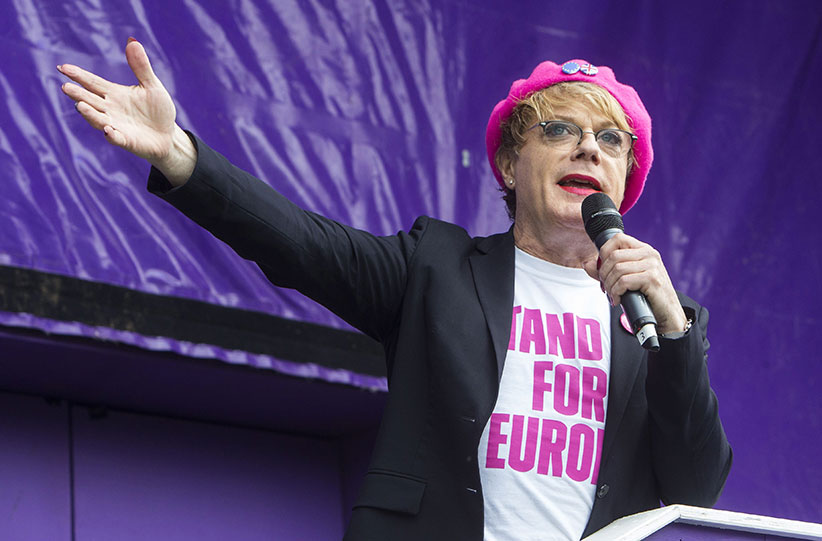
It’s a sunny Saturday afternoon in an outdoor beer garden next to the London Eye Ferris Wheel, and Izzard has brought his Stand Up for Europe lecture tour to the capital. Thirty-one cities in 31 days, interspersed with his regular show, Force Majeure, which he performs three times a night, in German, French, and then English. (A few nights before in Bristol, 150 people turned up for the German set, and 250 for the French one, he says proudly.) Wearing a pink beret and matching lipstick, sporting a Union Jack on one of his painted nails and dressed in a black suit and stiletto heels, he spends an hour talking up the virtues of a wider international community, and the dangers of leaving it. Low-cost flights to the Continent will disappear, he warns. So will an agreement that bans extra roaming charges for cellphones. But he admits it’s much harder to convince people to embrace the EU on merit than it is to try and scare them. “The positive arguments are difficult. The negative ones are simple,” says Izzard. “I think extremist politics is beguiling because it’s one-stop shopping. Real politics is as complicated as it seems.”
The opinion pollsters may be wrong. They certainly were last spring, when they unanimously predicted a minority government, likely led by Labour. Or just as they were during the 2014 Scottish independence referendum, when they failed to detect a 10-point advantage for the No side. But the sudden swing toward Brexit won’t make the final two weeks of the campaign any friendlier, or less frantic. The Remain side has unleashed an all-out attack on Boris Johnson and Michael Gove, denouncing Leave’s “economic con tricks.” Sir John Major, the former prime minister, exited his crypt for a TV interview in which he called Bojo a “charming court jester,” but sniffed at his “squalid” campaign, warning that he’s damaging both the party and his own ambitions. As the value of the pound plunges, and alarms sound about a “massive” outflow of capital, the dire warnings of job losses—3,600 positions at risk, says the head of Hitachi, 16,000 per the chairman of JP Morgan—might suddenly sound more convincing.
With all the scary numbers, competing claims, insults and invective, confusion remains the dominant theme among British voters. Many say they don’t know who to believe. For others, it hardly matters. Peter Whiteley, of Low Biggins, Kirby, Lonsdale, penned a letter to the Yorkshire Post last week, recounting how a stay at a Scarborough B&B several years ago had influenced his views on the EU. “At breakfast, I asked the proprietress if she could give me some warm milk to have with my cereal,” he wrote. “She replied: Due to EU regulations we are not allowed to heat milk in the microwave so I am unable to give you any.” Whitely still wonders if the claim was true, or simply an excuse, noting she could have heated some up in a pan. But concluded that he will be voting Leave—just in case.
Mike Galsworthy, a London health researcher, was so dismayed at the tone and content of the debate that he and a friend started their own pro-Union group, Scientists for EU, quickly acquiring more than 116,000 likes on Facebook, and 14,000 followers on Twitter. “There’s been this colossal, nationwide rejection of expert opinion,” he laments. “There’s this Trumpist attitude of British superiority. A sense of ‘damn the consequences.’ ” The EU has been a boon for British science, he says, providing 17 per cent of the country’s research funding, and opening access to jobs, talent, and cross-border collaborations. As well, it has given the country a major say in shaping scientific rules for the Continent, which often go on to become the global standard. All 132 university chancellors in the U.K. support Remain, and a recent survey by the Campaign for Science and Engineering found that 93 per cent of researchers agreed that EU membership had proven a “major” benefit. “We know it would be bad for science if we pulled out,” says Galsworthy. “But the media are focused on the political soap opera, not the facts.”
Eddie Izzard’s jokey, pro-Euro monologue lasts about 30 minutes, then he takes questions from the audience. “If the EU is so great, how come it’s so boring?” asks one young man. The comedian riffs for a bit on how we all prefer horror films to movies about nice people drinking coffee, but it’s not much of an answer. After it’s all over, a line forms for pictures and autographs. Paul Edkins, a business consultant in his early 30s, says he came because he’s a big fan of Izzard’s, but that he also agrees with him about the value of the EU. “To turn around a continent from centuries of hate and killing in just 60 years is remarkable,” Edkins says. “I see it as a forward-thinking project.”